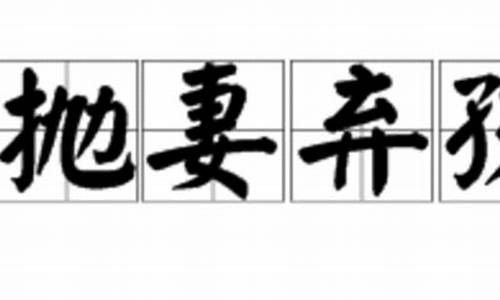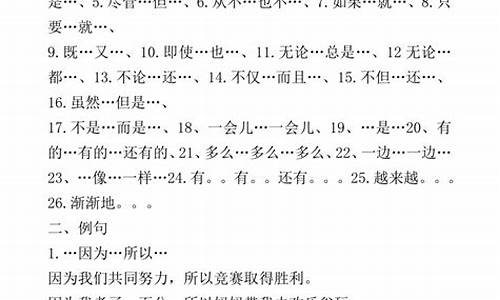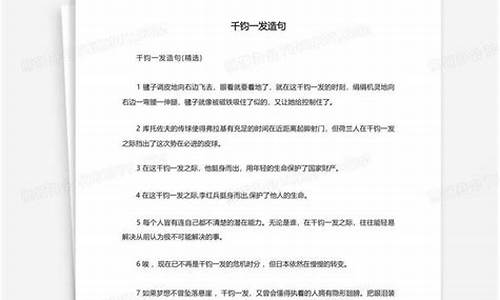您现在的位置是: 首页 > 成语出处 成语出处
belligerent_belligerent和bellicose的区别
tamoadmin 2024-10-06 人已围观
简介1.求ambitious.aggressive区分2.为什么法语是拉丁语系的而不是日尔曼语系的?3.英语阅读题里的常用词和常用句有哪些啊?4.1.4从词根看词缀5.英文中词根词缀是什么东西?没有哪位当代诗人的作品能因近乎无从下手地难懂而享有盛名,而且很少有人能拥有如此强势不留情面的道德观。但是最近,人们对他的严苛冷峻的诗歌的那种焦躁的需求竟然发生了难以置信的转变。这个新专辑是诗人六年来的第四本书—
1.求ambitious.aggressive区分
2.为什么法语是拉丁语系的而不是日尔曼语系的?
3.英语阅读题里的常用词和常用句有哪些啊?
4.1.4从词根看词缀
5.英文中词根词缀是什么东西?

没有哪位当代诗人的作品能因近乎无从下手地难懂而享有盛名,而且很少有人能拥有如此强势不留情面的道德观。但是最近,人们对他的严苛冷峻的诗歌的那种焦躁的需求竟然发生了难以置信的转变。这个新专辑是诗人六年来的第四本书—— 即使对开朗健谈的诗人来说也是高产的了,更不用说像他这种前50年一直过着苦行僧式惜字如金生活的人。然而虽然他近来文思如泉涌,他的诗歌还是一如既往地晦涩难懂。
impenetrable 本身就有晦涩难懂的意思,这里指无从下手,不知道从哪里开始理解
penitential 和austerity:都是说很节制,这里指说话或作诗有节制,不多。
volubility:和上面相反,指健谈,作品多产。
这里是原文,你可以从中更好地看出关键词的含义。
No poet of our day has such a well-earned reputation for difficulty as the Englishman Geoffrey Hill, and there are few whose moral vision is so imperiously unsparing. Of late, however, the almost belligerent demands of Hill's severe and densely forbidding poetry have taken an improbable turn: part of what's become daunting about his work is simply keeping up with it all. ''The Orchards of Syon'' is Hill's fourth book in six years -- an ample output even for poets of sunny disposition, but for one of Hill's penitential austerity over the previous 50 years, it is something closer to a mutinous outburst. What then to make of a Hill who no longer snarls through clenched teeth but instead seems bent on talking himself hoarse? Cast as a sequence of 72 uniform blank-verse soliloquies compounded out of a dissonant amalgam of demotic jabber and oracular utterance, ''The Orchards of Syon'' confirms that Hill, for all his newfound volubility, can be as refractory as ever: if the ceremonious tenor of these poems places them in the autumnal tradition of the classical eclogue, their elliptical convolutions and clotted allusions recall Eliot at his most esoteric and Pound at his most incoherent. But for readers with the patience and stamina to stick with it, Hill's brooding meditations on his ancestral countryside's ''wintry swamp-thickets, brush-heaps of burnt light'' or ''the burring air of the fell'' carry the haunting force of a last will and testament.
求ambitious.aggressive区分
词根词缀 在总论中我们讲过, 英文单词的主要构成部分是两类词素:词根和词缀。 什么是词根?词根是一个单词的根本部分,表示一个单词的基本意义。 例如: 词根 举例 peal-/pel-/pulse=push/drive 推动,驱使 appeal 吸引,求助;呼吁;上诉 compel 强迫, 迫使 dispel 驱散, 驱逐, expel 驱逐, 开除, 排出, 发射 impulse 推动, 刺激, 冲动, propel 推进, 驱使 bel-=make war 交战 rebel 造反;叛乱 belligerent.好战的, 交战的 bellipotent 战力强大的 vig/vit/viv-=life 生命;精力 vigour 精力, 活力 vital 生命攸关的,至关重要的 vivid 生动的 revive 复活,回想 survive 幸存 上面的例子表明,词根的意义代表了单词的中心意义,再结合词缀的意义,即产生了单词的意义。 什么是词缀? 词缀是给单词以补充意义。主要分为前缀和后缀。前缀,在词根之前,给词根以补充意义;后缀,在词根之后,主要表示词类,有的具有微弱的补充意义。 例如: 前缀 词根 后缀 举例 ex-=out出自/向外 -pand =spread 展开 expand 扩展 port-拿,带 -able 可……的 portable可携带的 im- 不;在……中 poss(e)-可能的 mod-模型(保持在一定限度内) port携带/入港 -ible可能的
希望采纳
为什么法语是拉丁语系的而不是日尔曼语系的?
ambitious:规模宏大的,热望的,矫饰的,华丽的,有抱负,有雄心
词类变化
ambitiously 副词
同义词
aspiring
例句
He is ambitious for social status.
他极欲获得社会地位.
aggressive:侵略的,攻势的,挑衅的,气势汹汹的,积极进取的,精力旺盛的
词类变化
aggression 名词
aggressively 副词
aggressor 名词
反义词
defensive
同义词
warlike
scrappy
pugnacious
offensive
militant
martial
hostile
combative
belligerent
bellicose
英语阅读题里的常用词和常用句有哪些啊?
英语属于日耳曼语族,其语族还包括德语、荷兰语、斯堪的纳维亚半岛各主要语言。
法语属于拉丁语族,其语族还包括意大利语、西班牙语、葡萄牙语和罗马尼亚语。
这2大语族都同属:印欧语系
印欧语系是最大的语系,下分印度、伊朗、日耳曼、拉丁、斯拉夫、波罗的海等语族。
推荐法文的起源
英语和法语的源源还是很长的:
拉丁是法语的祖先,英语中许多拉丁系统的语词和词素究竟是直接来自拉丁,抑来自法语,或来自拉丁的其他后裔如义大利或西班牙语,是很难确定的;但无论如何,拉丁系统的语言在英语词汇中的份量,与日耳曼语言对抗是绰绰有余。
英语中许多意思都可以随意选用日耳曼字或拉丁字来表达,分别不大;譬如 god 与 deity,ghost 与 spirit,end 与 terminal,oversee 与 supervise。在日常生活的范围,日耳曼词汇是英语的主体,但随着智识水准升高,拉丁的比重增加,终于凌驾其上。
英国人爱用朴实的日耳曼基本名词,如 sun, moon, son and daughter, tree, stone, fight,可是与这些名词相应的形容词却多是以拉丁词干构成的,如 solar, lunar, filial, arboreal, lapidary, pugnacious 或 belligerent。又如名词「火」是英语固有的 fire,动词「生火」却是拉丁的 ignite;「法律」是古英语传下来的 law,「立法」却是拉丁的 legislate。
法语为罗曼语系河印欧语族的一支,起源自拉丁文。
语属于印欧语系日耳曼语族中的西日耳曼语支。
1.4从词根看词缀
考研英语常用的阅读同义词替换
conventional
traditional, historical, past. accepted, common, regular, routine, mainstream, ordinary
early
first, old, ancient, primitive, previous, former, remote
simulate
virtual, create, reproduce, pretend, imitate
artificial
synthetic, fabricated, contrived, fake, mock, bogus, counterfeit, pseudo
reduce
curtail, cut, decrease, halve, impair, lessen, moderate, trim, slash
future
whats next, prospect, approaching, expected, destined, forthcoming
worldwide
international, cosmopolitan, global, universal, ubiquitous, widespread, around the world
develop
evolve, advance, grow, improve, progress, flourish
find
discover, come across, encounter, hit on, expose, notice, note, observe, recognize, spot, uncover
demand
request, claim, need, order, require, call for
decline
decrease, degeneration, 0drop, fall, recession, depression, reduction, slump, worsening
significance
importance, milestone, impact, justification, gist, implication, point, purport, vital
prevelant
common, usual, prevailing, widespread, systematic, collective, general, popular
objection
chanllenge, complaint, disapproval, opposition, protest, query, question, remonstration
obstacle
bar, barricade, barrier, block, blockage, check, obstruction, problem, snag, hurdle
commercial
business, economic, financial, mercantile, profitable, pecuniary
inevitable
unavoidable, certain, destined, fated, inescapable, sure
millitary
armed, belligerent, army, weapon, warlike
role
function (provide, support, weaken, smooth, solve), job, position, duty, post, task, contribution
recent
modern, current, now, nowadays, today, contemporaneous, new, novel, present, up-to-date
difficulty
handicap, hardship, adversity, challenge, complication, dilemma, perplexity, plight, trouble
how
describe, operate, explain, clarify, demonstrate, eludicate, expound, illustrate, interpret, account for
☆artificial
synthetic, fabricated, contrived, fake, mock, bogus, counterfeit, pseudo
☆conventional
traditional, historical, past; accepted, common, regular, routine, mainstream, ordinary
☆demand
request, claim, need, order, require, call for
☆decline
decrease, degeneration, drop, fall, recession, depression, reduction, slump, worsening
☆develop
evolve, advance, grow, improve, progress, flourish
☆difficulty
handicap, hardship, adversity, challenge, complication, dilemma, perplexity, plight, trouble
☆early
first, old, ancient, primitive, previous, former, remote
☆find
discover, come across, encounter, hit on, expose, notice, note, observe, recognize, spot, uncover
☆future
what's next, prospect, approaching, expected, destined, forthcoming
☆how
describe, operate, explain, clarify, demonstrate, eludicate, expound, illustrate, interpret, account for
☆inevitable
unavoidable, certain, destined, fated, inescapable, sure
☆militant
armed, belligerent, army, weapon, warlike
☆objection
commercial challenge, complaint, disapproval, opposition, protest, query, question, remonstration
☆obstacle
bar, barricade, barrier, block, blockage, check, obstruction, problem, snag, hurdle
☆prevalent
common, usual, prevailing, widespread, systematic, collective, general, popular
☆reduce
curtail, cut, decrease, halve, impair, lessen, moderate, trim, slash
☆role
function (provide, support, weaken, smooth, solve), job, position, duty, post, task, contribution
☆recent
modern, current, now, nowadays, today, contemporaneous, new, novel, present, up-to-date
☆simulate
virtual, create, reproduce, pretend, imitate
☆significance
importance, milestone, impact, justification, gist, implication, point, purport, vital business, economic, financial, mercantile, profitable, pecuniary
☆worldwide
international, cosmopolitan, global, universal, ubiquitous, widespread, around the world
解决:solve, resolve, deal with, cope with, handle, tackle
消除:get rid of, eradicate, eliminate
依赖:rely on, depend on, count on
十分:very much, immensely, hugely, largely, greatly, enormously, tremendously
损害:damage, hurt, injure, harm, impair
给予:give, offer, render, impart, provide
发展:develop, cultivate, foster
优势:advantage, merit, virtue, benefit, upside, strength
缺陷:disadvantage, detect, demerit, drawback, downside, weakness
Context: setting, circumstances, environment
Spectacular: stunning, impressive, magnificent, dazzling, breathtaking
Habitat: home, locale, environment, surroundings
Infect: contaminate, pollute, taint, poison
Cite: quote, mention, refer to, allude to
Better: improvement, advancement, progress
Convert: change, alter, transform, renovate
Functional: operational, serviceable
Fascinate: captivate, charm, enthrall, entice, allure
Undertake: take on, assume, carry out
Designate: title, entitle, term, call
Identify: recognize, pinpoint, detect, ascertain
Senior: leading, chief, primary, superior, major
Incorporate: include, absorb, integrate, unite
Multifarious: diverse, varied, various, miscellaneous, diversified
Avenue: method, approach, methodology
Underlie: lie beneath, bring about, trigger, cause, inspire
Domain: area, field, sphere, province, realm, territory
Orientation: direction, positioning, placement, location
英文中词根词缀是什么东西?
前言
从词根出发探讨词缀问题。借此机会还分析了词根与词缀间的对应关系,介绍了数十个最常用的原生词缀。根据词根的性质把构词词缀分成两种:
1.能与自由词根结合的是 派生词缀 ,
2.只能与粘附词根结合的是 原生词缀 。
正文
常见的词缀模式
词缀是常见的,例如在unfriendly、whitewasher、blessings、united 这4个派生词中,一般读者很容易就辨认出un-、-er、-ly、-ing.-s、-ed等词缀。
读者们也一定学过,词缀可以分为两类:
1.派生词缀,可加在单词上构成派生词,如un-、-er、-by、-ing 等;
2.屈折词缀,可加在词尾上表示语法关系,如:-ing(表示进行时)、-ed(表示完成时)、-s(表示名词复数)等。
新问题:粘附词根引起的词缀问题
如果检视前面出现的含有粘附词根的单词,就可以分析出许多与粘附词根“相对的成分”。在以下例子中,左边是含有粘附词根的单词,右边是其中所包含的“相对的成分”词根常与词缀结合共生共存,如果词缀没有合法的身份,词根的地位也就岌岌可危了。
首先,由于词汇发展的历史,英语中存在着不同语源的词缀:本族语词缀与外来语词缀。un-、-ly、-er、-ing、-ed、-s等都是本族语词缀;上面分析出来的“相对的成分”都是外来语词缀,主要是古典语词缀。在 现代英语 中, 两种词缀虽然都失去形态上的独立性 ,却 依然拥有自己稳定的形态、含义与语法属性,都是最小的、有意义的语法单位。 所以,它们全都符合词素的定义。英语词缀词素这些基本属性对于分析英语单词是非常有意义的。
1.原生词缀”(Primitive Affix) 。
本族语的词缀都能与单词(包括基本单词即自由词根)结合,属于平常所说的 派生词缀 。外来语词缀的功能则较为复杂。随着外来语词“整机输人”的外来语词缀,都是那些只能与粘附词根结合的“进口附件”,作者将此类词缀定名为 “原生词缀”(Primitive Affix) 。
2.派生词缀(一些被同化的外来语词缀,这里的外来指的是希腊和拉丁)
前面提到的“相对的成分”都属于“原生词缀”。如果不掌握这些词缀,就无法认识由粘附词素构成的数以万计的古典语词。有趣的是,这些“进口附件”也逃脱不了被英语改造与同化的命运。这种改造不仅是经历了“正字”的洗礼( 所有的古典语后缀都经历过“正字”的技术处理 ),而且是在构词功能与含义方面的新生。多数被同化的词缀都变成可以与单词结合的派生词缀, 部分被同化的词缀甚至被赋予新的含义 。例如,原生词缀ex-在exceed(超出)中的含义是“ex-=out(出)”,被同化之后却变成“ex-= former(前)”,如ex-president(前总统);又如,原生前缀pro-= forward(向前),而派生前缀pro-= in favorof(亲-.),试比较progress(前进)与pro-CGermany(亲德国的);再如,原生前缀re-= back(回),而派生前缀re-= again(再),试比较regress(退回)与reborn(再生)。可见,读者们平常掌握的派生词缀中不仅有本族语词缀, 也有一些被同化的外来语词缀 。
总结
1.从构词功能上看
英语词缀可分为 派生词缀与原生词缀 :派生词缀能与自由词根及单词结合,原生词缀只能与粘附词根结合。由于原生词缀只存留在数以万计的古典语借词中,尚不为一般读者所掌握,所以是词缀学习的重点。
2.词根与词缀的关系是主从的关系。
词根与词缀是构词的两个要素,词根是基本词素,词缀是辅助词素。
从 形态 上说,词根可以不带词缀而独立构词,即自由词根单独构成基本单词;词缀离开词根却寸步难行。
从 语义 上说,词根带有主要的词汇信息,成为单词的核心,体现出单词的基本意义;词缀只带有次要的词汇信息,帮助词根构成意义更为丰富、具体、细致、复杂的各种词类的单词。
所以,在学习英语词素时,要抓住词根,兼顾词缀。
原生词缀
把原生词缀分成4类:
1.介词性或副词性原生词缀、
2.修饰/限定性原生词缀、
3.名词性原生词缀
4.动词性原生词缀。
1.介词性或副词性原生词缀。
这类词缀的前身一般是介词,有的也可以用作副词。它们主要依附于动词性的词根,指示或限定这个动作的时间、方向、方式等。主要有以下这些:
1)a-(异体有ab-,abs-)= from从,离;
[例]ab-+ solv(to loose)+-e-+absolve(词义为toloosefrom解除)
2)ad-(ac-,af-,ag-,al,an-,ap-,ar-,as-,at-)= towards向
[例]af-+fect(to make)
→affect(to make something towards,or act upon影响)
3)an[例]ante-+ced(to go)+-e
→ antecede(to go before原先,先前)
4)anti-(ant-)= against相对,相反
[例]anti-+ path(to feel)+-Vy(名词性后缀)
→antipathy(feeling against反感)
5)circum-= around围绕
[例]circum-+ locut(to speak)+-ion(名词性后缀)
→circumlocution(roundabout speaking迂回说法;委婉话)
6)com-(co-,col-,con-,cor-)= together with与,共
[例]con-+nect(tojoin)
→ connect(to join with连接;联系)
7)de-= off,from离开,从,由
[例]de-+ duc(to lead)+-e
→deduce(to lead or draw a conclusion from推论)
8)dis-(di-,dif-)= apart分离
[例]dif-+fer(tobring)
→differ(to bring apart or disagree分歧;相异)
9)ex-(e-,ef-)=out出,外
[例]e-+lect(tochoose)
→elect(to choose out选出;选举)
10)in-(en-,em-,i-,im-,ir-)= in,into内,人
[例]in-+ clud(to shut)+-e
→include(to shut in or contain包含;包括)
11)inter-(intel-)= between,among在-之间
[例]inter-+ ven(to come)+-e
→intervene(to come between介人;干涉)
12)ob-(oc-,of,op-)= in the way of,against拦阻;对抗
[例]of-+fend(to hit)
→offend(to hit against or displease得罪;冒犯)
13)pre-= before,beforehand在.之前,事先
[例]pre-+ dict(to say)
→predict(to say or tell beforehand预言)
14)pro-= for,forward向,向前
[例]pro-+ceed(togo)
→proceed(to go forward行进;进行)
15)re-= back,again返,再
[例]re-+ vis(tosee)+-e.
→ revise(to see again in order to correct errors修正)
16)se-= aside偏,离
[例]se-+ duc(to lead)+-e
→seduce(toleadaside引诱;勾引)
17)sub-(suc,suf,sug-,sup-,sur,sus-)= under在.之下
[例]sub-+ merg(to sink)+-e
→submerge(to sink under沉没;淹没)
18)super-= over,beyond在-之上,超越
[例]super-+ vis(tosee)+-e
→supervise(to see over or oversee监督;管理)
19)syn-(syl,sym-,sys-)= together with与,共
[例]sym-+ phon(to sound)+-y(名词后缀)
→symphony(sounding music together交响乐)
20)trans-= across,through越过,穿过
[例]trans-+ port(to carry)
→transport(to carry across运输)te-= before在.之前
2.修饰/限定性原生词缀。
这类词缀的前身多是表示否定、数量、状态等含义的副词、数词或形容词。下面介绍的主要是表示否定、数量等关系的前缀以及几个表示性质状态的后缀。
1)a-(an-)= not,without不,无[例]an-+ arch(rule)+-y(名词后缀)
→anarchy(society without rule无政府状态)
2)bi-(bin-)= two二
[例]bi-+ocul(eye)+-ar(形容词后缀)→binocular(of two eyes双目的)
3)tri-= three三
[例]tri-+angul(angle)+-ar(形容词后缀)
→triangular(of three angles三角的)
4)in-(ig,il-,im-,ir-)= not不
[例]ig-+ nor(to know)+-e
→ ignore(not to know不知;不理)
5)iso-= equal相等的
[例]iso-+ gon(angle)+-ic(形容词后缀)
→isogonic(of equal angles等角的)
6)male-(mal-)= il,bad恶的,坏的
[例]male-+dict(tospeak)+-ion(名词后缀)
→malediction(ill speaking诅咒;诽谤)
7)bene-= good好的
[例]bene-+fact(todo)+-ion(名词后缀)
→benefaction(good doing or good deed善行)
8)neo-= new新的
[例]neo-+log(tospeak)+-ism(名词后缀)
→neologism(new speaking or new word新词)
9)-ant(-ent)= being表示性质状态的后缀
[例]bell(war)+-一+ ger(to carry)+-ent
→belligerent(being carried into war交战中的)
10)-able(-ible,-ile)= able or able to be能.-的
[例]aud(to hear)+-ible
→audible(able to be heard听得见的)
11)-ac(-al,-ar,-ic,-ical,-id)= of,like---的,像--的
[例]cardi(heart)+-ac
→cardiac(of the heart心脏的)
12)-ive = able(to do)有-能力的,能..的
[例]co-+ hes(to stick)+-ive
→cohesive(able to stick together能粘合的)
3.名词性原生词缀。
这类词缀都是名词后缀,它们的前身多是一些表示性质、状态、特征的名词或词根。主要有-acy,-ance,
-ence,-ion,-ment,-tude,-ity,y,-ure 等。这些名词后缀的意义大致等于“the state,act,condition or quality of(doing or being)”。
准确的含义则依具体的单词而定。下 面略举数例以资说明:
1)fall(to err)+-acy_
→fallacy(the state of erring谬误)
2)cap(to hold)+-ac-+-ity
→capacity(the ability of holding容量;能力)
3)sent(to feel)+-+-+-ment
→sentiment(the condition of feeling感情)
4)vis(to see)+-ion
→vision(the ability of seeing视力)
5)cert(settled)+-i-+ tude
→certitude(the state of feeling settled or certain确信)
6)fract(to break)+-ure
→fracture(the result of being broken破碎)
4.动词性原生词缀。
这类词缀前身是动词性词根,它们依附在名词性或形容词性的词根上,使之动词化。主要有三个:-ate,fy和-ish。它们的意思都相当于“to make"“to have”,或者“tocausetobe”。例如:
1)anim(life)+-ate
→animate(to make or put life into 使活跃)
2)un(one)+-i-+-fy
→unify(to make into one body使合一;统一)
3)ad-+ mon(to remind)+-ish
→admonish(to cause to be reminded of a fault告诫)
根是词语的组成根本。从词根我们可以变化出一个词语的不同变化,如:时态、动作之类的表示。
详细解释:根缀法巧记单词
英语词汇浩如烟海, 学习者屡经沉浮, 难言畅游,诸多学子因此慨叹遭遇“滑铁卢”。其实,“世上无难事,只怕有心人。”英语单词的构成还是有规律可循的。只要掌握规律,便可举一反三,记忆单词,不在话下。
一、 构词原理简介
(二) 词根词缀
在总论中我们讲过, 英文单词的主要构成部分是两类词素:词根和词缀。
什么是词根?词根是一个单词的根本部分,表示一个单词的基本意义。
例如:
词根 举例
peal-/pel-/pulse=push/drive 推动,驱使 appeal 吸引,求助;呼吁;上诉
compel 强迫, 迫使
dispel 驱散, 驱逐,
expel 驱逐, 开除, 排出, 发射
impulse 推动, 刺激, 冲动,
propel 推进, 驱使
bel-=make war 交战 rebel 造反;叛乱
belligerent.好战的, 交战的
bellipotent 战力强大的
vig/vit/viv-=life 生命;精力 vigour 精力, 活力
vital 生命攸关的,至关重要的
vivid 生动的
revive 复活,回想
survive 幸存
上面的例子表明,词根的意义代表了单词的中心意义,再结合词缀的意义,即产生了单词的意义。
什么是词缀? 词缀是给单词以补充意义。主要分为前缀和后缀。前缀,在词根之前,给词根以补充意义;后缀,在词根之后,主要表示词类,有的具有微弱的补充意义。
例如:
前缀 词根 后缀 举例
ex-=out出自/向外 -pand =spread
展开 expand 扩展
port-拿,带 -able 可……的 portable可携带的
im- 不;在……中 poss(e)-可能的
mod-模型(保持在一定限度内)
port携带/入港 -ible可能的









